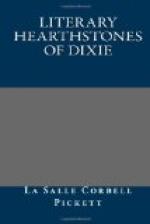Meeting Street seems to have been named with reference to its uses, for here, too, was the old theatre, gone long ago, where Fannie Ellsler danced with a wavering, quivering, shimmering grace that drove humming-birds to despair. In that theatre it may be that Paul Hayne heard Jenny Lind fill the night with a melody which would irradiate his soul throughout life and reproduce itself in the music-tones of his gently cadenced verse. There the ill-fated Adrienne Lecouvreur lived and died again in her wondrous transmigration into the soul of the great Rachel.
When a boy, Hayne’s heart may have often thrilled to the voice of the scholarly Hugh Swinton Legare, as he made the heart of some classic old poem live in the music of his organ-tones.
A sensitive soul surrounded by the influences of life in old Charleston had many incentives to high and harmonious expression.
That the Queen City of the Sea did not claim the privilege of the fickleness alleged to be incident to the feminine character is illustrated by the fact that she had but two postmasters in seventy years, a circumstance worthy of note “in days like these, when ev’ry gate is thronged with suitors, all the markets overflow,” and the disbursing counter is crowded with claimants for the rewards due for commendable activity in the campaign. One of those two was Peter Bascot, an appointee of Washington. The other was Alfred Huger, “the last of the Barons,” who had refused to take the office in the time of Bascot.
In old Charleston the servants were the severest sticklers for propriety, and the butlers of the old families rivalled each other in the loftiness of their standards. Jack, the butler of “the last of the Barons,” was wide awake to the demands of his position, and when an old sea captain, an intimate friend of Mr. Huger, dining with the family, asked for rice when the fish was served he was first met with a chill silence. Thinking that he had not been heard, he repeated the request. Jack bent and whispered to him. With a burst of laughter, the captain said, “Judge, you have a treasure. Jack has saved me from disgrace, from exposing my ignorance. He whispered, ’That would not do, sir; we never eats rice with fish.’”




